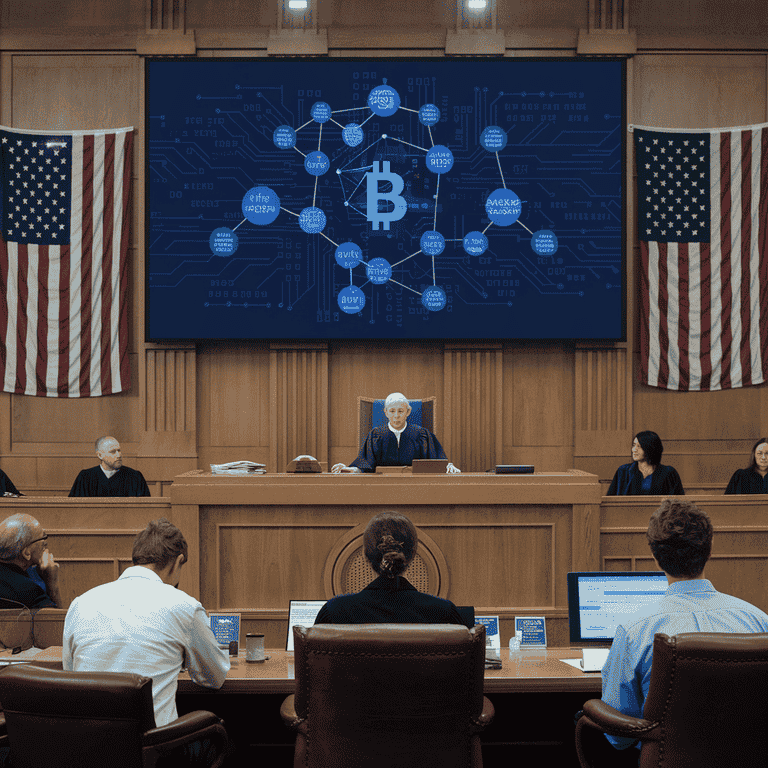Cryptocurrency is changing how we think about money. With its rise, legal systems face new challenges, particularly in criminal cases.
In Nevada, understanding cryptocurrency seizure is crucial for those involved in the legal system. Knowing the laws and processes surrounding digital currency seizure can make all the difference, whether you’re an individual accused of a crime or an attorney representing a client.
This article explores how cryptocurrency works, the legal framework in Nevada, and what happens when digital assets are seized in criminal cases.

Understanding Digital Currency
What Is Cryptocurrency?
Cryptocurrency is a form of digital money that exists only online. Unlike traditional money, it’s not issued or controlled by governments or banks. Instead, it relies on a technology called blockchain to operate.
Definition and Key Features
- Decentralized: No single authority, like a bank, controls it.
- Secure: Transactions are encrypted, making them hard to alter.
- Anonymous: Users’ identities are hidden, but transactions are visible on the blockchain.
- Global: You can send and receive cryptocurrency anywhere in the world instantly.
Common Cryptocurrencies
Here are some of the most widely used cryptocurrencies:
| Cryptocurrency | Symbol | Key Use |
|---|---|---|
| Bitcoin | BTC | Digital gold, investment |
| Ethereum | ETH | Smart contracts |
| Tether | USDT | Stablecoin |
| Ripple | XRP | Cross-border payments |
How Cryptocurrencies Are Stored
- Wallets: Digital wallets store private keys. They can be:
- Hot Wallets: Connected to the internet (e.g., apps).
- Cold Wallets: Offline storage (e.g., hardware wallets).
- Exchanges: Platforms where users buy, sell, and store cryptocurrencies.
- Private Keys: Unique codes granting access to your funds. Lose them, and your cryptocurrency is gone forever.
How Cryptocurrency Differs from Traditional Currency
Cryptocurrency operates differently from the cash in your wallet or your bank account.
Decentralization and Blockchain Technology
Central banks manage traditional currencies like the U.S. dollar, but cryptocurrencies use blockchain technology:
- A blockchain is a public ledger that records all transactions.
- Each transaction is verified by a network of computers, not a single institution.
Anonymity and Pseudonymity
Unlike traditional financial systems that use names and account numbers:
- Cryptocurrencies use alphanumeric addresses, adding a layer of privacy.
- Transactions are recorded publicly, but the identities behind them remain hidden unless revealed.
Volatility and Market Behavior
- Traditional currencies: Value is relatively stable, backed by governments.
- Cryptocurrencies: Value can change dramatically in minutes, driven by market demand and speculation.
Legal Framework for Cryptocurrency in Nevada
Nevada’s Cryptocurrency Regulations
Cryptocurrency is a relatively new area of law, and Nevada has specific regulations to address its use. These laws aim to balance innovation with the need for oversight.
Overview of State Laws
- Nevada was one of the first states to embrace blockchain technology.
- In 2017, Nevada passed laws making blockchain records legally valid and preventing local governments from taxing blockchain use.
- While these laws support innovation, they do not exempt cryptocurrencies from being involved in criminal cases.
Federal Laws Impacting Nevada Cases
Federal laws also play a significant role:
- Bank Secrecy Act (BSA): Requires cryptocurrency exchanges to report suspicious transactions.
- Anti-Money Laundering (AML) Rules: Apply to activities like fraud, tax evasion, and money laundering involving cryptocurrency.
- Federal agencies like the FBI and IRS often assist in digital currency cases.
Key Legal Precedents
Some legal cases set the tone for how Nevada handles cryptocurrency:
- United States v. Ulbricht: Highlighted how cryptocurrency is seized in online crime cases (e.g., Silk Road).
- SEC v. Ripple Labs: Focused on whether specific cryptocurrencies qualify as securities.
Role of Cryptocurrency in Criminal Cases
Cryptocurrency has become a tool in criminal activities. Its anonymity and ease of transfer make it attractive to bad actors.
Types of Crimes Involving Cryptocurrency
Common crimes involving cryptocurrency include:
- Money laundering: Criminals use cryptocurrency to move money across borders without detection.
- Fraud: Scams like fake ICOs (Initial Coin Offerings) trick people into losing money.
- Drug trafficking: Cryptocurrencies are used on dark web marketplaces to buy illegal goods.
- Hacking: Criminals steal cryptocurrency from exchanges and wallets.
Evidence Collection in Cryptocurrency-Related Crimes
Proving a crime involves tracing cryptocurrency transactions. This is done using:
- Blockchain analysis tools: Programs that track transactions on the public ledger.
- Subpoenas: To request information about wallet owners from exchanges.
- Seizure warrants: Allow law enforcement to access wallets or exchanges holding illicit funds.
Challenges Law Enforcement Faces with Cryptocurrency
Despite advancements, law enforcement struggles with:
- Anonymity: Identifying who owns a wallet is often tricky.
- Global nature: Cryptocurrency transactions cross borders, complicating jurisdiction.
- Encryption: Without private keys, accessing funds is nearly impossible.

Cryptocurrency Seizure in Nevada Criminal Cases
How Cryptocurrency Is Seized
Seizing cryptocurrency isn’t as simple as taking cash. It requires specialized tools and knowledge.
Methods Used by Law Enforcement
- Tracking Transactions: Blockchain analysis tools identify suspicious wallets.
- Seizing Exchanges: Law enforcement can freeze funds on centralized platforms.
- Accessing Private Wallets: This requires obtaining private keys, often through court orders or cooperation.
Importance of Securing Private Keys and Wallet Access
Without a private key, seized cryptocurrency is useless. Law enforcement must:
- Work with cybersecurity experts to safely store and manage keys.
- Prevent theft or loss during the seizure process.
Technology Involved in Tracking and Seizing Digital Assets
- Forensic Software: Tools like Chainalysis help uncover transaction histories.
- Cold Storage Devices: Used to store seized assets securely offline.
- Multisignature Wallets: Require multiple approvals to move funds, enhancing security.
Legal Justifications for Cryptocurrency Seizure
Cryptocurrency is often treated like property in legal cases. To seize it, law enforcement must follow strict protocols.
Probable Cause and Search Warrants
- Law enforcement needs probable cause to believe cryptocurrency is tied to criminal activity.
- A judge must approve a search warrant before funds can be accessed.
Asset Forfeiture Laws in Nevada
Nevada allows asset forfeiture if the assets are linked to criminal activity:
- Civil Forfeiture: No conviction is needed, but the burden of proof lies with the state.
- Criminal Forfeiture: Requires a conviction before assets are seized permanently.
Differences Between State and Federal Jurisdiction
- State Cases: Focus on crimes within Nevada’s borders.
- Federal Cases: Handle more extensive operations, often involving multiple states or international actors.
Rights of Individuals Facing Cryptocurrency Seizure
When facing cryptocurrency seizure, knowing your rights can make a big difference.
Due Process Rights in Asset Seizures
- You have the right to be informed about why your cryptocurrency was seized.
- You can challenge the seizure in court to prove the funds were legally obtained.
Steps to Contest a Seizure in Nevada Courts
- Hire a Defense Attorney: Look for one with experience in cryptocurrency cases.
- File a Claim: Assert your ownership and challenge the seizure.
- Provide Evidence: Show the funds were legally earned.
Legal Defense Strategies for Protecting Cryptocurrency
- Disputing Probable Cause: Argue the seizure was unjustified.
- Challenging Procedures: Prove law enforcement didn’t follow proper protocols.
- Highlighting Misuse of Asset Forfeiture: Show the seizure was excessive or unfair.
Implications of Cryptocurrency Seizure
Financial Impact on Individuals
When cryptocurrency is seized, it can have serious consequences for the individual involved.
Loss of Assets Without Conviction
One of the most controversial aspects of cryptocurrency seizure is civil forfeiture. In these cases, assets can be seized without a criminal conviction. This means:
- Individuals may lose access to their cryptocurrency before their case is resolved.
- Even if proven innocent, recovering the funds can be lengthy and costly.
Costs of Legal Defense
Fighting a seizure in court often requires the following:
- Hiring a skilled attorney with cryptocurrency expertise.
- Paying for forensic experts to trace transactions and prove the funds’ legitimacy.
- The financial burden can be overwhelming, especially if the seized assets were a person’s primary financial resources.
Broader Implications for the Cryptocurrency Industry
Cryptocurrency seizures don’t just affect individuals—they send ripples through the entire industry.
Trust in Digital Financial Systems
When governments seize cryptocurrency, people may question the safety and reliability of digital currencies.
- Users may fear losing access to their funds due to legal actions.
- It could discourage people from using cryptocurrencies for legitimate transactions.
Effects on Innovation and Regulation
Seizures often lead to increased scrutiny and regulation, which can:
- Slow down innovation: Developers may hesitate to launch new projects.
- Increase compliance costs: Exchanges and businesses must invest heavily in AML and KYC (Know Your Customer) processes.
- Encourage decentralization: Some industries may move away from centralized systems to avoid regulatory oversight.

Defending Against Cryptocurrency Seizure in Nevada
Choosing the Right Defense Attorney
When facing a cryptocurrency seizure, choosing the right attorney is critical.
Importance of Cryptocurrency Expertise
Not all attorneys understand the complexities of digital currency. Look for someone who:
- Knows how blockchain and wallets work.
- Has experience handling asset forfeiture cases.
- Understand Nevada’s unique cryptocurrency regulations.
Key Questions to Ask Your Attorney
- “How many cryptocurrency cases have you handled?”
- “What is your success rate in asset recovery?”
- “Do you work with blockchain forensic experts?”
- These questions can help you find an attorney well-equipped to handle your case.
Building a Strong Defense Case
A strong defense requires strategy, evidence, and attention to detail.
Investigating Seizure Procedures
Your attorney should carefully review how law enforcement seized your cryptocurrency:
- Was there a valid warrant?
- Did they follow proper chain-of-custody protocols?
- Were any private keys or wallet details obtained unlawfully?
Challenging Probable Cause and Evidence Collection
If law enforcement lacked sufficient probable cause, the seizure might be invalid. Key points to investigate include:
- Whether the seized cryptocurrency is genuinely tied to criminal activity.
- If the blockchain evidence used was accurate and reliable.
Leveraging Legal Precedents
Your attorney can use past cases to strengthen your defense. For example:
- Highlight instances where courts ruled seizures invalid due to procedural errors.
- Reference Nevada-specific rulings to argue for asset return.
Recovering Seized Cryptocurrency
If your cryptocurrency has been seized, it’s not necessarily gone forever.
Process for Contesting Seizures
Here’s what you can expect when contesting a seizure:
- File a Claim: You must submit a formal request to challenge the seizure.
- Court Hearing: A judge will review the case and decide whether the seizure was lawful.
- Provide Evidence: You’ll need to prove the funds were obtained legally and are unrelated to criminal activity.
Success Stories and Case Studies
There have been cases where individuals successfully recovered seized cryptocurrency:
- In one case, a Nevada resident proved their funds were legitimate business earnings.
- Another example involved a judge ruling against law enforcement due to improper seizure protocols.
While success isn’t guaranteed, a strong defense can significantly improve your chances.

Future Trends and Considerations
Evolving Laws on Cryptocurrency Seizure
Cryptocurrency is constantly changing, and the laws surrounding it are evolving just as fast.
New Legislative Proposals in Nevada
Nevada lawmakers are keeping a close eye on cryptocurrency. Proposed laws aim to:
- Increase transparency in cryptocurrency-related investigations.
- Provide clear guidelines for law enforcement on handling and securing seized digital assets.
- Offer better protections for individuals, ensuring due process is followed in all seizure cases.
These changes could make seizures more predictable and fair while improving public trust in the legal system.
Federal vs. State Trends
Agencies like the SEC and IRS are introducing stricter regulations at the federal level. In contrast, Nevada is:
- Leaning toward blockchain-friendly policies to attract tech companies.
- Balancing innovation with the need to prevent misuse in criminal activities.
The interaction between state and federal laws will shape how seizures are conducted in the future.
Increasing Sophistication of Cryptocurrency Tracking
Law enforcement tools for tracking cryptocurrency are becoming more advanced.
Advances in Blockchain Analytics
Blockchain analysis tools are getting better at uncovering hidden transactions. These tools can:
- Identify patterns that suggest illegal activity.
- Link wallets to real-world identities by analyzing transaction behaviors.
- Map out entire networks of wallets involved in a crime.
Implications for Privacy and Security
While these tools help solve crimes, they raise concerns:
- Loss of privacy: Even legitimate users may feel their financial data is at risk.
- Security breaches: Advanced tracking could expose vulnerabilities in personal wallets.
As technology evolves, the debate between privacy and security will continue to grow.

Breaking It All Down
Cryptocurrency has brought incredible innovation, but it has also created unique legal challenges. In Nevada, understanding the laws and processes surrounding cryptocurrency seizure is essential.
If you’re involved in a case where digital currency is seized, remember:
- Laws are evolving, and your rights must be protected.
- Hiring an experienced attorney with cryptocurrency knowledge can make all the difference.
- Building a strong defense is possible with the right approach and resources.
As cryptocurrency becomes more mainstream, staying informed is your best defense against legal complications. Nevada’s laws may be complex, but you can navigate them successfully with the proper guidance.

Frequently Asked Questions
What is the difference between civil and criminal asset forfeiture?
Civil forfeiture allows law enforcement to seize assets, including cryptocurrency, without requiring a criminal conviction. On the other hand, criminal forfeiture requires the individual to be convicted of a crime before their assets can be permanently seized.
Can cryptocurrency stored in a cold wallet be seized?
However, accessing cryptocurrency in a cold wallet is more challenging for law enforcement. They need to obtain the private keys, which are often secured offline. Without the keys, the funds cannot be accessed or moved.
What happens if a cryptocurrency exchange is hacked during a seizure process?
Law enforcement agencies typically use secure methods, like cold storage and multi-signature wallets, to prevent theft during seizures. If an exchange is hacked before or during a seizure, recovering the funds may become significantly harder, complicating the case.
Does Nevada have unique cryptocurrency seizure protocols compared to other states?
Nevada follows both state and federal guidelines but is considered blockchain-friendly. This dual approach ensures cryptocurrency is handled according to evolving federal standards while supporting innovation locally.
How long does it take to recover seized cryptocurrency in Nevada?
The timeline varies depending on the complexity of the case. If significant legal challenges arise, it could take weeks to months or even years. Factors include the strength of your claim, court schedules, and whether the seizure was part of a more extensive investigation.
Can international cryptocurrency transactions be involved in Nevada cases?
Yes, cryptocurrency’s global nature often involves transactions across borders. This can lead to federal involvement, as international cases frequently exceed Nevada’s jurisdiction.
What role do cryptocurrency exchanges play in seizures?
Exchanges often cooperate with law enforcement during investigations. If ordered by a court, they may freeze accounts, provide transaction details, or hand over funds stored on their platforms.
Is decentralized finance (DeFi) subject to the same seizure laws?
Yes, but DeFi poses unique challenges. Since DeFi platforms lack centralized control, law enforcement cannot target a single entity like they would with an exchange. Tracking and seizing funds in DeFi ecosystems require advanced tools and strategies.
Can using privacy coins like Monero protect against seizure?
Privacy coins add layers of anonymity, making transactions more challenging to trace. However, law enforcement agencies are developing tools to track these transactions, and using privacy coins doesn’t exempt users from seizure if they are linked to criminal activity.
What happens to cryptocurrency after it is seized?
Seized cryptocurrency is often held in secure wallets by law enforcement or auctioned off once the case is resolved. Funds raised through auctions typically go into government accounts or are used to support law enforcement efforts.
How can I prove my cryptocurrency is legitimate if seized?
To prove your cryptocurrency is legally obtained, you’ll need evidence such as:
- Transaction records from exchanges or wallets.
- Documentation of income or investments that funded the purchases.
- Witness statements or expert analysis supporting your claims.
What are the chances of recovering seized cryptocurrency?
The likelihood depends on the case’s specifics, including whether the seizure followed legal protocols and the strength of your defense. Hiring an experienced attorney increases your chances of recovering funds.
Are NFT assets treated the same as cryptocurrency in seizures?
Non-fungible tokens (NFTs) can also be seized if linked to criminal activity. The process is similar, but NFTs may require additional steps for valuation and storage.
If I pay taxes on cryptocurrency, can it still be seized?
Yes, paying taxes on cryptocurrency does not exempt it from seizure if law enforcement links it to criminal activity. However, evidence of tax compliance can support your case and prove the funds are legitimate.

Additional Resources for You from The Rosenblum Allen Law Firm.
Here are the additional resources created by our lead attorney, Molly Rosenblum Allen, Esq., each with a brief description to guide you:
Criminal Defense Attorneys
If you’re facing criminal charges, our criminal defense attorneys provide effective representation. They offer a thorough defense to protect your rights and help you navigate the legal system.Las Vegas DUI Lawyer
A DUI charge can have serious consequences. Our Las Vegas DUI lawyers specialize in defending clients charged with driving under the influence, ensuring you receive the best possible outcome.Domestic Violence Lawyer Las Vegas
If you’re involved in a domestic violence case, we offer experienced legal representation to protect your rights, whether you’re the alleged victim or the accused.Drug Possession Lawyer
Facing drug possession charges? Our skilled drug possession lawyers can help build a strong defense, potentially reducing or eliminating penalties.Sex Crimes Attorney
Charges related to sex crimes are serious and require a lawyer with experience in defending such cases. Our attorneys are here to ensure your rights are protected throughout the process.CPS Defense Attorney
If you are facing accusations of child abuse or neglect, our CPS defense attorneys are committed to defending your parental rights and protecting your family’s future.Misdemeanor Lawyer
Misdemeanor charges may seem minor, but they can still lead to significant consequences. Our misdemeanor lawyers work to minimize penalties and defend your reputation.Las Vegas Warrant Defense Attorney
If you have a warrant out for your arrest, our Las Vegas warrant defense attorneys can assist in handling the matter efficiently and work toward clearing your name.Las Vegas Probation Violation Attorney
Violating probation can lead to severe consequences. Our probation violation attorneys will help you understand your options and defend your case to avoid harsher penalties.Theft Crime Defense Lawyer
Whether it’s shoplifting, burglary, or grand theft, our theft crime defense lawyers specialize in providing strong defense strategies to protect you from theft-related charges.Kidnapping Lawyers
Kidnapping charges carry serious penalties. Our kidnapping lawyers are experienced in handling such sensitive and complex cases, working hard to ensure the best defense.Juvenile Defense Lawyers
If your child is facing criminal charges, our juvenile defense lawyers focus on protecting their future by guiding them through the juvenile justice system with care and expertise.Firearms Lawyer Las Vegas
Whether you’re dealing with illegal possession, trafficking, or misuse of a firearm, our firearms lawyers in Las Vegas provide skilled defense to protect your rights.
Each of these services has been created to help guide and defend you during some of the most challenging times. Feel free to explore these links to learn more about the effective legal assistance available to you.

Offsite Resources for You
American Translators Association – www.atanet.org
A comprehensive resource for professional translators, offering certification, tools, and resources for anyone interested in translation services.
ProZ.com – www.proz.com
A platform where professional translators and clients connect, offering forums, job postings, and resources for legal translation professionals.
Globalization and Localization Association – www.gala-global.org
GALA supports professionals in translation and localization, with resources and networking opportunities for those involved in legal translation work.
The Institute of Translation and Interpreting – www.iti.org.uk
A professional body for translators and interpreters, offering accreditation, education, and resources for legal translators.
National Association of Judiciary Interpreters and Translators – www.najit.org
A valuable resource for translators and interpreters specializing in legal proceedings, with tools and information on court-related translation needs.
AI for Good Foundation – www.aiforgood.org
A nonprofit that promotes the use of artificial intelligence to benefit society, including applications in translation and legal technologies.
Global Translations – www.globaltranslations.com
Specializing in translation and localization services, Global Translations offers expertise in legal translation and other industries, providing access to a range of language services.

A Special Message from Our Lead Attorney, Molly Rosenblum Allen, Esq

Thank you for taking the time to explore these resources. I hope you found the information helpful and insightful. If you’re facing legal challenges or have questions about your situation, I’d be happy to assist you further.
I invite you to schedule a free consultation by calling (702) 433-2889. Together, we can discuss your case and explore the best path forward.
I look forward to hearing from you!
Warm regards,
Molly Rosenblum Allen, Esq.





